Japanese Personnel at International Organizations*1 Playing Active Roles on the Front Lines across the World amid the COVID-19 Pandemic
Mr. NAKAI Kojiro
Deputy Emergency Coordinator, Cox’s Bazar Office, United Nations World Food Programme (WFP) Bangladesh
Ms. MOTOKAWA Namiko
Programme Policy Officer, Cox’s Bazar Office, WFP Bangladesh
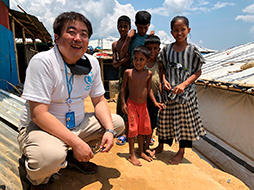
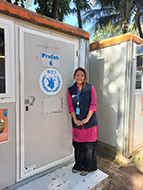
Since August 2017, WFP provides food assistance, nutrition services and life-skills support for approximately 900,000 displaced persons from Myanmar as well as approximately 600,000 residents of host communities, in the Cox’s Bazar District, the southeastern part of Bangladesh. In response to the COVID-19 pandemic, WFP took COVID-19 prevention measures in E-voucher*2 outlets in the camps. Together with the Government of Bangladesh, WFP also managed access of humanitarian aid organizations to the camps for displaced persons using QR codes and provided assistance to host communities. Although we were flying blind every day as there was no precedent for providing support amid the COVID-19 pandemic, we all did our best to perform our duties under the motto “No regrets.”
With the support from the Government of Japan, we provided fresh vegetables and fruit, rice, cooking oil, and others through E-voucher shops. We also served cooked meals for more than 60,000 people when a massive fire broke out in the Kutupalong refugee camp in March 2021. In addition, in cooperation with Euglena Co., Ltd., a Japanese company, we provided technical support in mung bean cultivation for local farmers, and the harvested mung beans are sold at the E-voucher shops. Purchasing ingredients produced by local smallholders contributes not only to food security and nutrition improvement for the displaced persons, but also improves the sustainable livelihoods of the host communities. The cooperation between a Japanese company and WFP Japanese staff has secured employment for the host communities and has been highly appreciated by the Government and the people of Bangladesh.
Public nomination
Ms. HIROTA Miwako
United Nations Volunteer, Coordination and Reporting Officer, United Nations Population Fund (UNFPA) Mozambique
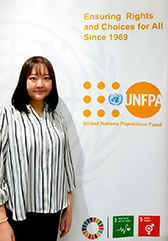
I am in charge of monitoring and evaluation, partnership building, public relations, and coordination for humanitarian assistance in the northern part of the country at the UNFPA Mozambique Office.
In Mozambique, successive attacks by insurgents and violent clashes with government forces in the northern province of Cabo Delgado have resulted in a humanitarian crisis, with an estimated 1.3 million people in need of emergency humanitarian aid. The number of internally displaced persons in the province has more than quadrupled in approximately one year, and now approximately one out of every three people in the province has been internally displaced.
Moreover, child marriages and gender-based violence cases have increased due to the humanitarian crisis with already existing damage caused by cyclones and the COVID-19 pandemic. This has made the conditions of women and girls even more difficult.
With the support of the Government of Japan, UNFPA implements projects to protect the safety and sexual and reproductive health*3 of women and girls among internally displaced persons and host communities. UNFPA plans to provide medical services to a total of more than 38,000 women and girls per year through mobile health clinics, including areas where access to healthcare has been very restricted.
I would like to continue my work supporting women and girls and contribute to their safety and health.
Public nomination
Ms. ITO Yuri
Project Support Officer, Ukraine Office, United Nations Office for Project Services (UNOPS)

I joined the UNOPS Ukraine Office in September 2018 as a Project Support Officer and was responsible for project management and procurement. (From May 2021, I work at the UNOPS Turkmenistan Office as a Project Management Support Senior Analyst.)
Since 2014, conflicts have continued in eastern Ukraine and 3.4 million people still need assistance. There is also a need to improve access to healthcare services for those wounded in the conflicts and to modernize obsolete medical equipment.
With the support of the Government of Japan, UNOPS has provided medical equipment to local hospitals every year since 2016. In 2020, despite logistical disruptions and production delays caused by COVID-19, we delivered X-ray machines, a surgical microscope, and laparoscope systems. Such equipment not only enables advanced diagnosis and treatment but also leads to improved work efficiency and reduced workloads among healthcare workers, contributing to the early recovery of injured patients and improvement of the medical system.
Public nomination
Ms. UCHINO Megumi
Humanitarian Programme Analyst (Junior Professional Officer (JPO)), United Nations Population Fund (UNFPA) Indonesia

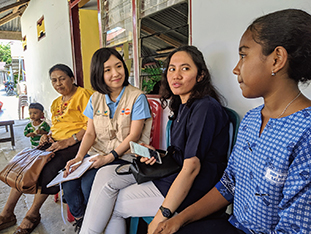
Soon after my arrival in Indonesia in November 2019, the first COVID-19 case was reported in the country. Without getting familiarized with the country context, I had to start working from home then. In the beginning of the pandemic, I saw many survivors of gender-based violence (GBV) unable to receive support due to the prolonged curfews and other restrictions. Pregnant women and nursing mothers could not receive prenatal and post-partum checkups, and felt anxious about childbirth and the post-partum period. Older persons and people with disabilities were also isolated and lost their sense of purpose in life. Seeing the growing number of COVID-19 cases every day and the widening disparities among people, I remember feeling frustration and helplessness – I felt like the time was just passing by without me being able to contribute to any of these problems in the beginning of the pandemic.
However, now, I am working in the development and implementation of a COVID-19 response project entitled “Leave No One Behind” funded by the Government of Japan, and contribute to improving the situation. Through this project, we are delivering life-saving assistance to vulnerable populations, including survivors of GBV, people living with HIV/AIDS, pregnant women, older persons, and people with disabilities.
Public nomination
Ms. UEMURA Kanami
Programme Officer (Child Survival and Development), Uganda Office, United Nations Children’s Fund (UNICEF)
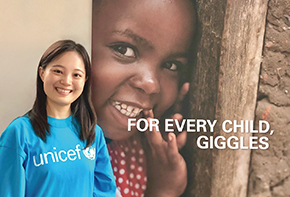
In Uganda, the first positive COVID-19 case was confirmed in March 2020, followed by the second wave around June 2021, which far exceeded the response capacity of the medical frontlines. Lockdown measures and health system strains have affected children in various ways, including dwindling immunization rates, deteriorating nutritional conditions, a loss of learning opportunities, and an increase in child marriages and early pregnancies.
I am involved in supporting Uganda’s COVID-19 countermeasures through activities that monitor vaccination progress and strengthen health and medical systems across the country.
The Government of Japan is an important partner for UNICEF to implement programs in Uganda. With Japan’s cooperation, UNICEF works to ensure access to critical services such as health care, water, sanitation and hygiene, and to improve nutrition. UNICEF also aims to realize Universal Health Coverage (UHC) together with the Government of Uganda, while expanding cold chain*4 facilities to store vaccines for COVID-19 at low temperatures as well as routine immunization vaccines.
The UNICEF Uganda office also lost some of its staff during the COVID-19 pandemic, and many personnel lost his/her loved ones. Even amid such circumstances, we continue to work every day for children who suffer from the impact of COVID-19.
Ms. ODASHIRO Keiko
Community Protection Officer, Sub-Office Pemba in Cabo Delgado Province, Mozambique, United Nations High Commissioner for Refugees (UNHCR)
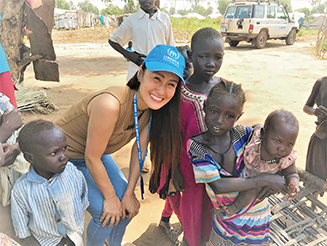
Attacks and violence by insurgents that began in 2017 in Mozambique’s Cabo Delgado Province have forced more than 700,000 people to flee their homes. Many people were separated from their families along the way. There was nothing to eat, and many people hid in the bushes to escape danger. Many children lost their parents.
UNHCR is working to guarantee human rights by providing shelter, non-food items, advice to the government on the provision of basic services, and monitoring. With the cooperation of the Government of Japan, UNHCR has also greatly contributed to rebuilding people’s lives by developing evacuation shelters for internally displaced persons, and giving them blankets, mattresses, mosquito nets, kitchen equipment, and other items.
I have always respected the strength and resilience of the people to survive and the way they face up to an uncertain future, even in difficult circumstances. I always feel honored to help them build their future.
- *1 Contributed by personnel at international organizations. Titles of individuals are all correct as of the time of writing.
- *2 A system in which food items can be purchased from e-voucher outlets (similar to grocery stores) using an electronic distribution card.
- *3 A state in which people have a safe and satisfying sex life, have the freedom to decide when, how many, with whom, and where to experience pregnancy and childbirth, and are physically, mentally, and socially satisfied with their sexual and reproductive health, regardless of their gender or age.
- *4 See *2.
